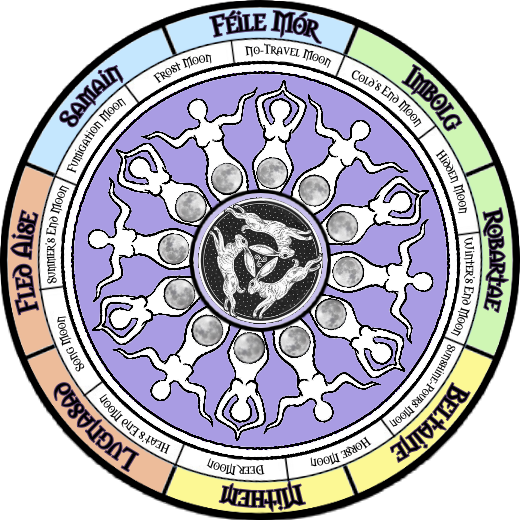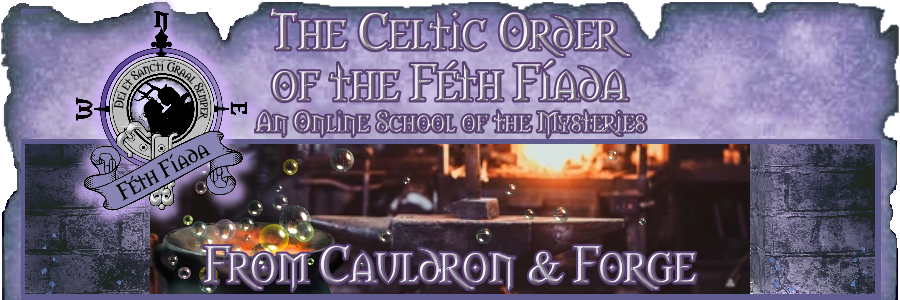
Here at COFF, we celebrate an eight-spoked Wheel of the Year, and we employ Old Irish names for all our Solar/Earth Festivals. A few of the reasons why we don’t use the “standard” Wiccan Wheel of the Year at COFF is because: (1) Féth Fíadans aren’t Wiccans; (2) the names of the Wiccan Sabbats are an admixture of Irish (Imbolc, Beltane, Lughnasadh, and Samhain), Welsh (Mabon), and Anglo-Saxon (Ostara, Litha, Yule); and (3) the God Mabon has no genuine historical claim to any Autumn Equinox tradition whatsoever. Rather, he is usually seen by Celtic scholars as being associated with either one or both of the solstices.
Many people argue that the Celts did not celebrate or otherwise mark the solstices and the equinoxes. But at COFF, we think it’s highly unlikely that a culture so exceedingly knowledgeable about astronomy that even the Greeks and Romans remarked on it would have failed to observe either the solstices or the equinoxes in some fashion, and in fact, much respected Celtic scholar Alexei Kondratiev points to some evidence that indeed they did observe them:
Although the specific date of the Autumn Equinox was not marked by any ritual in Celtic tradition, there is evidence that, at some point roughly halfway between Lúghnasadh and Samhain, communities would involve themselves with a ceremony that reflected the processes then at work in the year. This was usually a conclusion to ritual themes invoked at Lúghnasadh, and focused on the end of the main harvest activities (i.e., the grain harvest), although it did not imply the end of the entire Harvest season, which continued until Samhain. In the Coligny Calendar the day of xv Cantli is glossed as tiocobrextion. If some current interpretations of the calendar’s dating system are correct, this would usually fall on or about September 29 [thus within a week or less of the Autumn Equinox]; and if the name of the ritual is a dialectal development from teg(es)okomrextion “setting the house in order,” it would be an apt description of the spirit of a “harvest home” celebration, wrapping up agricultural activities for the year.”[1]
Other names for this Festival are: Fomhar na nGéan (“Goose Harvest”), Michaelmas, Alban Elfed (Modern Druid), Goel Myghal (Manx), Goeldheys (Cornish), Gouel Sant-Mikael (Breton), Gwyl Fihangel (Welsh), La Fhéile Mícheal (Modern Gaelic), and Lá Fhéile Míchíl (Modern Irish).
At COFF, we settled on Fled Aise (Feast of Age), because this was another name for Fled Goibnenn (Goibniu’s Feast). It was at this feast that the Smith God Goibniu served the ale or mead he brewed, which kept the Gods and Goddesses immortal, and brewing generally took place on or around the Second Harvest.
Kondratiev also notes the Coligny Calendar’s reference to Deuoriuos Riuri “Great Divine Feast of the Frost Month”[2], which seems quite likely to indicate the Midwinter celebration of the Sun’s return. We use a straight translation — Féile Mór (Great Divine Feast) — for this.
The Spring Equinox and Midsummer are even simpler. We call them Robartae and Mithem, respectively. Robartae (Springtide; Torrent, Flood, Innundation) derives from the Proto-Celtic *ro-bertiā (torrent, innundation), which was certainly an apt description of the springtide and its thaw around the Spring Equinox, when the snows melted and the mountain rivers and streams grew torrentious, innundating the plains and glens far below. Among other deities, Mother/River Goddess Danu (to Run, to Flow) is honored at this time, as, among other things, she symbolizes the fertility and lifeblood of the Land. Mithem just means “Midsummer.”
Our names for the Full Moons come from the Celts’ Coligny Calendar, a 1st Century BCE Gaulish peg calendar. We largely use Kondratiev’s translations for those, because we consider them the most accurate.
Blessings!
APs Rhianwen Bendigaid
Footnotes:
[1] Kondratiev, Alexei, The Apple Branch: A Path to Celtic Ritual. Citadel, 2003, pp. 209-210).
[2] Ibid, p. 224.










